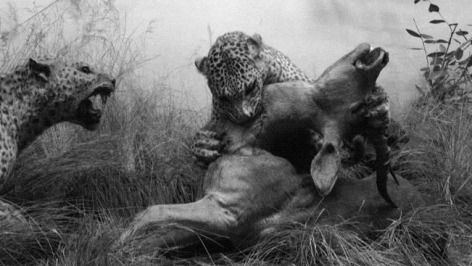 Somewhat recently I’ve become aware of two seemingly distinct arguments in favor of the idea that the conjunction of evolution and naturalism is prima facie more probable than the conjunction of evolution and theism. The first argument comes from Paul Draper who claims that the brutality of natural selection provides strong evidence against theism.
Somewhat recently I’ve become aware of two seemingly distinct arguments in favor of the idea that the conjunction of evolution and naturalism is prima facie more probable than the conjunction of evolution and theism. The first argument comes from Paul Draper who claims that the brutality of natural selection provides strong evidence against theism.
“For a variety of biological and ecological reasons, organisms compete for survival, with some having an advantage in the struggle for survival over others; as a result, many organisms, including many sentient beings, never flourish because they die before maturity, many others barely survive, but languish for most or all of their lives, and those that reach maturity and flourish for much of their lives usually languish in old age; in the case of human beings and some nonhuman animals as well, languishing often involves intense or prolonged suffering… [This] is extremely surprising given theism. It is not what one would expect to find in a living world created by a perfect God.” [1]
Natural selection, Draper argues, appears to cause large quantities of unnecessary suffering and hence is not a mechanism that a theistic God (i.e. an all-knowing, all powerful, all-good being) would have employed in creating the biological diversity and complexity we presently observe.
The second argument comes from Peter Milikan who argues that it is puzzling why a theistic God would utilize evolution if substance dualism (which is sometimes taken to be a necessary commitment of theism) were true.
“Most religions, including Christianity, would have us believe that our thoughts can exist quite independently of the brain, unimpaired, even enhanced after the brain and the whole body have been completely destroyed. Now, if this were true, that our mental capacities could exist quite independently of the physical brain, then one has to wonder what on earth has been going on during evolutionary history. The human brain has been growing larger and larger, demanding huge quantities of calories and nutrients to be developed and maintained, and expanding even to the extent of making childbirth seriously dangerous for human mothers. Yet if our thoughts takes place in immaterial soul, which can function perfectly well independently of the physical brain, then it’s utterly mysterious why this expensive and dangerous evolutionary progression should have taken place at all.” [2]
Milikan seems to be arguing two things here: (1) evolution’s application of selection pressures upon increasing neurological complexity over the course of evolutionary history provides grounds for believing that materialism is likely true, and hence that substance dualism is likely false, and (2) since theism (generally speaking, though not always) is seen as committed to the truth of substance dualism, that theism is likely false as well.
With all of that said, what are people’s thoughts? Do people think that the above two arguments are actually distinct? And if they are distinct, do they provide prima facie evidence for atheism? And finally, what do people think might be some compelling theistic objections that could be given in response to them?

Paul Draper’s argument, as far as I can tell, is (1) make up a personality that God, if he exists, has, (2) observe that the world is inconsistent with that personality, so therefore, the world must not be the result of a God.
I don’t buy it. If there is a God, I don’t see any reason he would be bound by to be of the mindset that Paul Draper demands of him. God could be perfectly O.K. with inflicting massive, pointless suffering, and even enjoy it, regardless of what Paul thinks.
LikeLike
While I agree with you that Draper’s argument (which is an evolutionary variation on what is known as “the problem of evil”) would not disprove the existence of a malevolent God, that’s not really the point, since the argument simply isn’t directed at that conception of the divine. Instead, Draper’s argument (and the problem of evil more generally) is concerned with the traditional theistic conception of God (i.e. a being that has three key attributes: omniscience, omnipotence, and omnibenevolence). Put another way, the “personality” Draper thinks the existence of evolution is in tension with is not simply “made up,” but rather is an accurate reflection of the tenets found in the major monotheistic religions.
Do you think that Draper’s argument shows that no such being with those three traits exist? If so, then the argument has been successful.
LikeLike
“It is not what one would expect to find in a living world created by a perfect God” — This statement presumes that one could have expectations about the behavior of a perfect being but it is not at all clear how an imperfect being would be able to accurately model and predict perfect behavior.
“…it’s utterly mysterious…” — said every mystic of every religious tradition ever.
LikeLike
Do you think it is possible for humans to have ANY warranted expectations about how a perfect being would act, or do you think that is impossible?
While it’s true that all models are imperfect (since they only ever approximate the subject matter that they are modeling) and the epistemic gulf between ourselves and God is quite severe, does that thereby mean that we can know NOTHING about divine motivations?
Moreover, if this is right, and we can’t know anything about divine motivation (excluding even probabilistic warrant), then I’m not really sure what sense we can make out of the claim that God is “all-good,” since, given our massive epistemic limitations, it might turn out that being “all-good” means the exact opposite of what we standardly associate with what is just and right.
LikeLike
I think we can discern and attribute “goodness” in a non-trivial fashion but it’s not just our imperfect modeling of a perfectly good mind that’s the problem. Our capacity for judgment with regard to existence is also extremely limited, so any “expectation” with regard to the state of the world is doubly troubled by imperfection and subjectivity.
LikeLike
I hope I’m not being too picky here, but I think in the large part these concepts of theism are too western leaning, or maybe just both Millikan and Draper should replace “theism” with “monotheism.” Draper’s argument falls apart as soon as we depart from the Judeo-Christian tradition. Milikan’s argument for the necessity of substance dualism doesn’t prove much in terms of the existence of a god. In analogy, I would have to compare substance dualism, the way he states it, as a similar relationship to hardware, operating system, and software, if you follow my train of thought.
LikeLike
“…maybe just both Millikan and Draper should replace ‘theism’ with ‘monotheism.'”
It’s all in how one defines one’s terms. Both Millikan and Draper are defining the particular variety of “theism” that they are critiquing as the view that there exists an all-knowing, all-powerful, all-good being. Moreover, even though that is generally the assumed definition given these kinds of debates (for better or worse), Draper himself actually explicitly defines it this way in his essay. He writes “…by ‘theism’ I mean not just the vague claim that ‘God exists,’ but the more specific hypothesis that an omnipotent, omniscient, and morally perfect entity–I will call such an entity a ‘perfect God’ for short–created the natural world.”
“Draper’s argument falls apart as soon as we depart from the Judeo-Christian tradition.”
As I mention in my comment to Johnny above, the target of the problem of evil (of which Draper’s argument is a variation) is the traditional conception of God found in the major monotheistic traditions (i.e. a being that is all-knowing, all-powerful, and all-good). So while it is true that the argument wouldn’t demonstrate the non-existence of any God that lacked any one of those attributes (e.g. an all-knowing, all-powerful, non-all-good God), that does not mean that the argument fails; that’s simply not the argument’s intended target.
“In analogy, I would have to compare substance dualism, the way he states it, as a similar relationship to hardware, operating system, and software, if you follow my train of thought.”
Hmm, the software vs. hardware distinction is usually made in defense of materialism. One’s computer, for instance, is generally assumed to be a completely physical object, even though its processing can be described from two distinct levels of description (i.e. hardware and software). The question is if the brain/mind parallels this distinction. If substance dualism is right, it does not, since on that view the mind is fundamentally non-physical and very much unlike a physical computer.
LikeLike